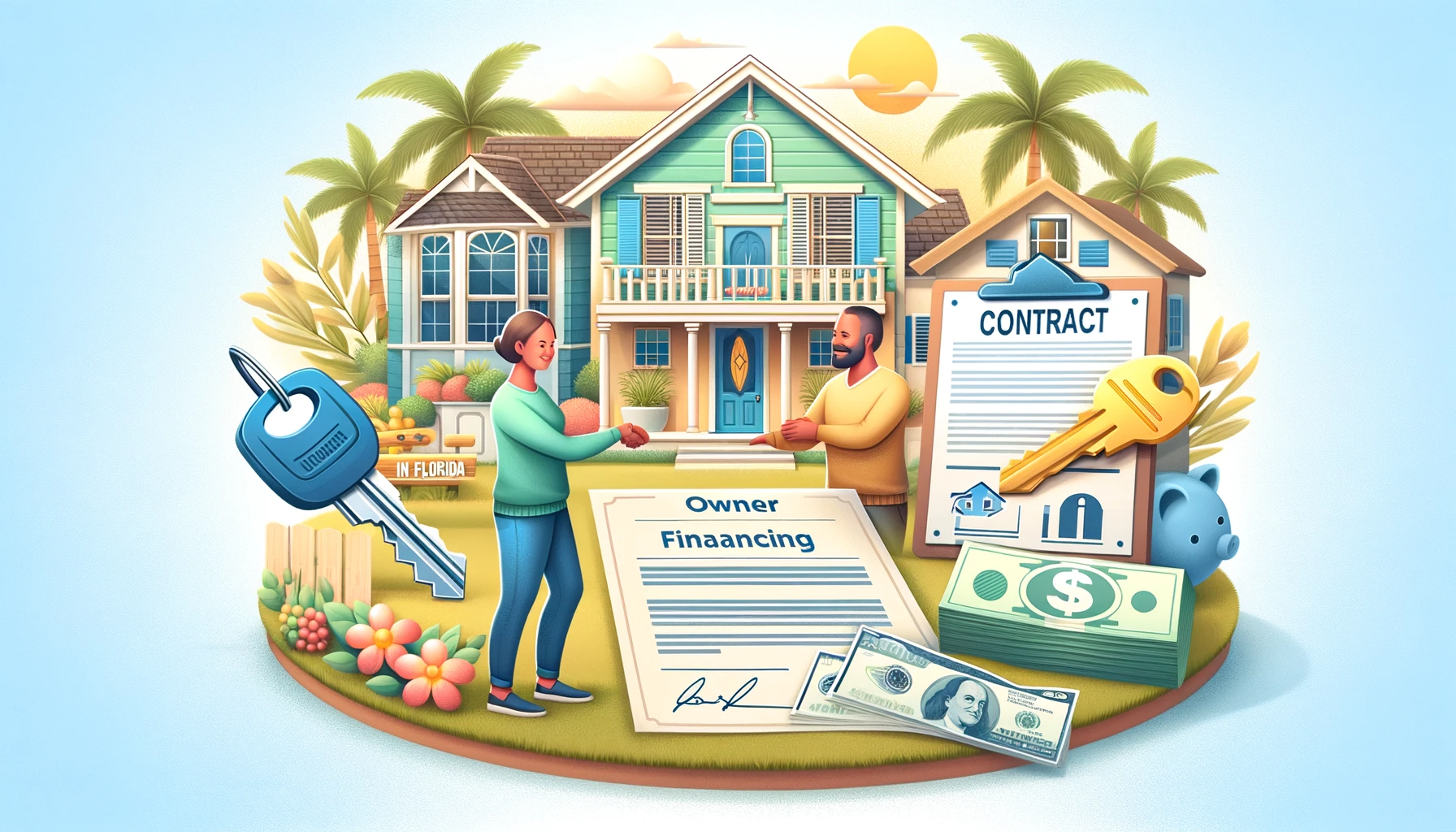
Understanding Deed Ownership in Owner Financing: Legal Insights

Key Highlights
- Who Holds the Deed in Owner Financing: Understand the implications of deed possession and how ownership typically transfers in these arrangements.
- Deed Ownership Explained: Find out what legal and equitable titles mean in owner financing.
- Common Structures: Learn about the Contract for Deed and Seller-Financed Mortgage.
- Tips for Buyers and Sellers: Get practical advice to help you manage owner-financed deals.
- Legal Considerations: See why it’s important to talk to a real estate attorney and know your state laws.
- Protective Measures: Discover ways to protect both sides during the transaction.
Are you thinking about owner financing or seller financing for your next real estate deal? If you are a buyer or a seller, it is important to know the laws around deed ownership. This includes the promissory note and deed of trust. These are key parts of this special type of financing. Owner financing can be a good alternative to traditional mortgage loans. However, it comes with its own challenges about who owns the deed. This guide will help you understand deed ownership in owner financing. You will find useful information and tips to help you feel sure as you go through the process.
The Ownership Conundrum: Legal Title vs. Equitable Title
In real estate law, there are two main types of property ownership: legal title and equitable title. Knowing these ideas is important for understanding deed ownership in owner financing deals.
Legal Title
Legal title means being the official owner of a property, shown by the deed that is on record. The person with the legal title is the one named as the owner in public records. This title gives them the right to manage, sell, and transfer the property.
Equitable Title
Equitable title means the right to get full ownership of a property later on. A buyer usually has this title through a purchase contract. However, it does not give them immediate ownership rights like a legal title does. Those who hold an equitable title can use and get benefits from the property. Eventually, they can become the legal titleholders.

Common Structures in Owner Financing
Owner financing can work in different ways. The two most common types are the Contract for Deed and the Seller-Financed Mortgage.
Contract for Deed
The Contract for Deed, also called an installment sale contract, is a simple way for owner financing. Here is how it works:
- Seller Keeps Legal Title: The seller keeps the legal title and the deed until the buyer pays for everything as stated in the contract.
- Buyer Gets Equitable Title: The buyer gets equitable title when they buy the property. This gives them the right to live in and use the property. However, the deed goes to the buyer only after all payments are fully made.
This structure is popular because it protects the seller. It makes sure they keep control of the property until the buyer finishes their payments.

Seller-Financed Mortgage
The Seller-Financed Mortgage is similar to a traditional mortgage. In this case, the seller is the lender. Here’s what usually takes place:
- Buyer Gets Legal Title: At closing, the buyer gets the deed and legal title to the property. They gain full ownership rights right from the beginning.
- Seller Retains a Lien: The seller finances the mortgage loan for the buyer and keeps a lien on the property. This lien protects the seller until the loan is paid off. It allows the seller to take back the property if the buyer does not pay.
This method gives quick ownership to the buyer. At the same time, it keeps the seller’s money matters safe.
Wraparound Mortgage
A wraparound mortgage is a special way to finance a home when using owner financing. It helps buyers get a property while the seller keeps their own mortgage. Here’s how it usually works: The buyer pays both the seller’s mortgage and the purchase price of the property.
- Payment Structure: With a wraparound mortgage, the buyer pays the seller every month. The seller takes part of these payments to pay off their own mortgage. This sets up a new loan that works around the seller’s original loan.
- Interest Rate Benefits: Sellers can set a higher interest rate on the wraparound mortgage than what they pay on their current loan. This creates more income for the seller because they keep the extra money from the two different rates.
- Closing Costs Advantage: Wraparound mortgages can lower closing costs for buyers. They usually skip many fees that come with normal mortgages. This kind of loan can also offer a flexible repayment schedule to fit the buyer’s financial situation. This makes it a good choice for people who want to buy a home without the hassle of traditional financing.
State-Specific Laws and Legal Considerations
State laws play a big role in owner financing agreements. They can change the terms of the loan and the steps you need to take. It is important to talk to a real estate attorney who knows your area’s laws. This way, you can make sure your contract fits local rules, including property tax duties. Taking these steps is usually in your best interest.
- State Laws Vary: Different states have different rules and terms for owner financing. It’s important to learn your state’s specific laws to stay out of legal trouble.
- Consult Legal Experts: A real estate attorney can give you great advice that matches your local laws. This helps make sure your contract is legal and protects your interests.

Exploring the Pros and Cons of Owner Financing
Owner financing has good and bad points for both buyers and sellers in the real estate market. It is a type of real estate agreement. Knowing these points can help you decide if owner financing is right for your financial situation. Also, think about how your overall financial situation may affect the results.
- Pros of Owner Financing: For buyers, one major benefit is that the terms can be more flexible than with traditional mortgages. This works well for those who have bad credit or want to buy a home faster. Sellers can also attract more buyers, leading to a quicker sale of their property.
- Cons of Owner Financing: On the other hand, there are significant risks. Buyers might face higher interest rates and the chance of default. Sellers have to deal with managing their financing agreements and the possibility of buyer default. It is important for both buyers and sellers to understand these pros and cons when they think about owner financing as a good option in real estate.
For Sellers
When thinking about owner financing, sellers can gain several benefits. These advantages can improve their selling experience and help them earn more money.
- Higher Sale Price: A big benefit of owner financing is that you can sell your property for more money. Buyers might pay extra because they like the flexibility of getting financing directly from you, the seller.
- Seller’s Mortgage: When you are the lender, you will get regular monthly payments. This provides a steady income stream, which is great for those who want to boost their retirement money or keep cash coming in.
- Quicker Sale: Owner financing can help you sell your property faster. It avoids the long approval times of regular mortgages. This means you can close faster and feel less stressed when moving to another home.
For Buyers
Buyers who are interested in owner financing can gain several important benefits. These advantages meet their specific financial needs.
- Flexible Terms: A great thing about owner financing is how you can negotiate flexible terms. These terms might not be offered by traditional lenders. You could get lower down payments and payment plans that match your financial situation.
- Addressing Buyer Default: Even though buyers enjoy flexible terms, they should think about what happens if they fail to make payments. Buyers might need to give guarantees or extra security to show sellers they are serious.
- Credit History Considerations: For people with poor credit histories, owner financing gives them a chance to buy a home without strict rules from traditional mortgage lenders. This can help buyers finally own a home, even after facing credit issues.
When to Consider Owner Financing as a Viable Option
Owner financing can be a great option instead of traditional financing in some situations.
- Viable Option: Buyers who struggle with traditional financing due to credit issues or a small down payment may find owner financing works well for them. It offers more flexibility and helps them become homeowners.
- Pool of Buyers: Sellers might think about offering owner financing when the market slows down and finding buyers becomes hard. This option can help sellers reach more potential buyers and make a quicker sale while still having control over the terms of the deal.
From the Seller’s Perspective
Understanding how sellers feel about owner financing is very important for anyone thinking about this option.
- Financial Institution Alternatives: When sellers provide owner financing, it makes their property a good option compared to traditional bank loans. This choice can attract buyers who may have trouble getting loans from banks.
- Sales Contract Clarity: Sellers must create clear sales contracts. These contracts should explain the terms of the financing agreement, protecting the seller’s interests and helping both sides know their responsibilities.
- Potential Buyers: Sellers need to look closely at the financial health of potential buyers. A careful check can help reduce the risks of buyer default and lead to a successful deal.
From the Buyer’s Perspective
Buyers thinking about owner financing should look at several factors. This will help them make better choices.
- Poor Credit Solutions: If you have poor credit, owner financing can help you buy a home when other options are not open. Buyers can talk about terms that fit their money situation.
- New Home Acquisition: Owner financing can help you get a new home. It lets buyers skip regular mortgage tasks and move into their dream home faster.
- Financing Agreement Importance: It is very important for buyers to understand the point of the financing agreement. This can help you avoid problems. Getting legal help can make sure you know your duties and keep your interests safe during the whole process.
Navigating the Deed Maze: Tips for Buyers and Sellers

Tips for Buyers:
- Know Your Rights: Even if you don’t have the deed, your equitable title gives you important rights. This includes the right to live in the property.
- Clear Contract Details: Make sure your purchase contract clearly states what the seller must do to give you the deed after you make your final payment. Good documents are very important!
- Get Expert Help: Talk to a real estate lawyer before you sign anything. This will help you know your rights and duties. Companies like EPS Houses can help you find a good lawyer.
- Safety Clauses: Think about including a clause that states if the seller does not follow through, your payments will count towards full ownership. This offers extra safety.
- Get Title Insurance: Get title insurance to protect against any claims on the property while you have the contract.
- Check Property Condition: Carefully inspect the property. Make sure there are no liens or encumbrances.
Tips for Sellers:
- Keep Control: As the legal owner, you control the property until the buyer gets their loan. They can’t sell or borrow against it without your okay.
- Check Buyer’s Finances: Make sure to check the buyer’s ability to pay and get a regular loan before you agree to owner financing.
- Get Legal Protection: Talk to a real estate attorney. They can help make your contract cover defaults, late payments, and transferring the deed when the buyer meets all terms.
- Provide Clear Title: Clear any liens or debts from the property to give the buyer a clear title when the deed changes hands.
- Get a Down Payment: Ask for a large down payment from the buyer. This lowers your risk if they fail to pay the full amount later.

Expanding on Legal Nuances and Case Studies
Case Study 1: Successful Buyer-Seller Scenario
In a situation, John is a buyer. He makes an agreement called a Contract for Deed with Sarah, the seller.
- Agreement Terms: John will make monthly payments for five years. Sarah will keep the legal title, and John will get the equitable title when he signs the contract.
- Default Clause: If John does not keep up with his payments, he will lose his equitable title and any money he has already paid.
- Legal Protections: Both John and Sarah will talk to a real estate attorney to make sure their interests are safe.
Case Study 2: Complicated Legal Landscape
In another situation, a buyer named Jane makes a deal for a Seller-Financed Mortgage with a seller named Tom. This happens in a state that has its own specific legal rules.
- State-Specific Laws: The state has its own rules. It needs extra information and specific words in the contract to be valid.
- Legal Consultation: Tom and Jane meet with a real estate attorney who knows local laws. They want help to draft and check their contract.
- Successful Outcome: Thanks to good legal guidance, the deal goes well. Both sides feel happy with the result.

Advanced Protective Measures for Deed Ownership
Buyer Protections:
- Escrow Accounts: Creating escrow accounts for payments can help keep funds safe and make sure they are used correctly.
- Inspection Clauses: Add clauses that let you inspect the property regularly to keep it in good shape.
- Performance Bonds: Think about asking the seller to get a performance bond. This guarantees they will meet their responsibilities.
Seller Protections:
- Credit Checks: Make sure to check the buyer’s credit and finances closely. This helps lower the chances of not getting paid.
- Legal Liens: Quickly file legal liens to protect the seller’s money related to the property.
- Default Clauses: Make sure the contract has clear default clauses. These should explain what to do if the buyer does not pay on time.
FAQ Section
- What is legal title? Legal title means that you officially own a property, which is shown by a deed that has been recorded.
- What is equitable title? Equitable title is the right to get full ownership of the property later.
- What is a Contract for Deed? A Contract for Deed is a way of owner financing. In this case, the seller keeps legal title until the buyer pays in full.
How does the holder of the deed benefit in owner financing agreements?
The holder of the deed in owner financing agreements benefits by having a legal claim to the property until the loan is fully repaid. This provides security in case of default, allowing them to foreclose and take possession of the property if the buyer fails to meet the agreed terms.
Alternative Financing Options to Consider
Owner financing is a good choice. But there are several other financing options you can look into as well.
- Traditional Financing: Buyers who qualify might still choose traditional financing through banks or credit unions. These options usually have lower interest rates and better protections for consumers.
- Bank Loan Officer Guidance: Talking with a bank loan officer can give you ideas about different financing options. They can help buyers find the best choices based on their financial situation.
- Types of Financing: Along with traditional mortgages, buyers should look into government-backed loans like FHA or USDA loans. These can provide good terms for eligible borrowers.
This format helps the blog stay organized while covering the topics in detail. If you need any changes or extra content, just let me know!
Conclusion
The person who has the deed in an owner financing agreement can change. This depends on how the financing is set up and on the laws in each state. Here is a summary:
- Contract for Deed: The seller keeps legal title and the deed until the buyer finishes all payments in the purchase agreement. The buyer has equitable title.
- Seller-Financed Mortgage: The buyer gets legal title and the deed when closing happens. The seller has a lien as security until the loan is paid off.
Both buyers and sellers should act to safeguard their interests. They need to clearly state what is needed for the deed transfer in the purchase agreement. It’s very important to talk to a skilled real estate lawyer. This helps make sure that your contract follows local laws.
For specific help that suits your needs, contact the team at EPS Houses. With good planning and legal help, you can feel secure in handling owner-financed deals. If you have any questions about the deed ownership process, feel free to reach out to us for more answers.


